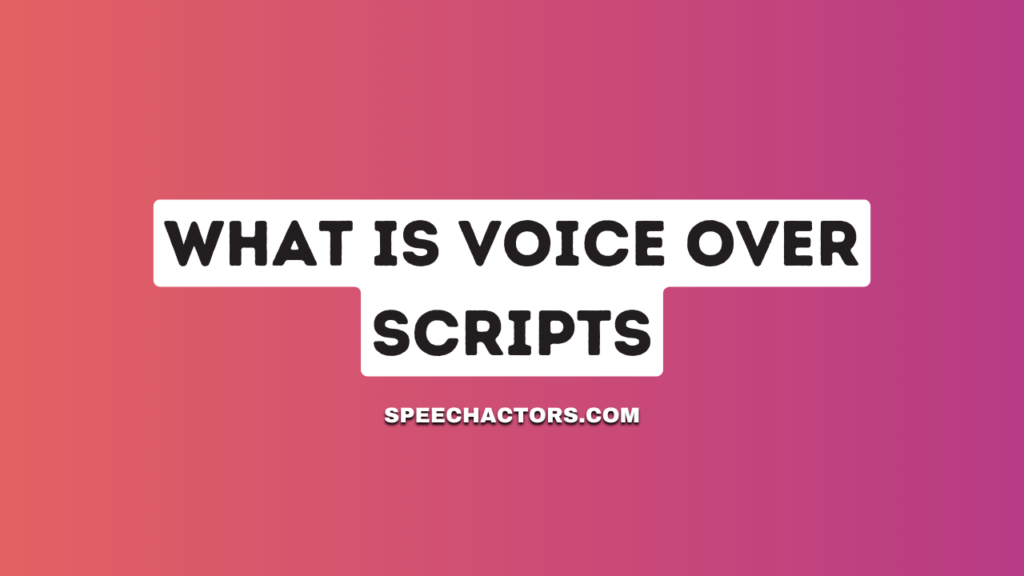Ever heard a voice in a commercial or video but didn’t see the person talking? That’s a voice-over, and the words they’re saying come from a voice-over script. These scripts are important for getting the message just right.
In this article, we’ll explain what voice-over scripts are and why they’re key in media like ads, videos, and more. You’ll get to know how these scripts are crafted and used. By the end, you’ll understand what voice-over scripts are, how to use the script.
What is a Voice Over?
A voice over is when someone talks in a video or show, but you don’t see them. It’s like when you watch a cartoon and hear the characters speak , that’s a voice over.
People use it in movies, TV shows, radio, and even ads. Sometimes, special people with great voices do this job. They record their voices to make sure it sounds good.
Today, we have tools to change and fix these recordings. It’s important to pick the right voice for the right job.
What is Voice Over Script?
Voice Over Script is a written document that tells the voice artist what to say during a recording. The script has the exact words they need to speak. It is used for making ads, videos, and radio shows.
Script makes sure the message is clear and goes as planned. It’s a piece of writing that guides voice artists about what to say when they’re recording. This document is handed over to them before the recording process begins.
By using a script, creators can ensure their message is presented just as they want, without any confusion.
How to Start Writing Voice Over Script?

Steps to Start Writing Voice Over Script:
Step 1. Find Purpose: First, decide why you’re making the recording. Is it for an ad, a video tutorial, or a radio show? Knowing the purpose will help you stay on track.
Step 2. Know Your Audience: Think about who will listen to this. If it’s kids, use simple words. If it’s professionals, use terms they understand.
Step 3. Write a Draft: Start with a rough version. Write down all the ideas and points you want to include.
Step 4. Short and Sweet: Keep your sentences short. This helps in making it easier for the voice artist and keeps the listener’s attention.
Step 5. Clear Message: Make sure there’s one main point or idea. Don’t confuse listeners with too many messages.
Step 6. Conversational Tone: Write as if you’re talking to someone. It makes it relatable and easy to understand.
Step 7. Include Pauses: Mention places where the voice artist should take a short break or pause. This gives listeners a moment to understand.
Step 8. Get Feedback: Show your script to someone else. They might have useful suggestions or catch mistakes. Sometimes others opinions may also be useful for any changes.
Step 9. Edit and Refine: Based on feedback, make changes. Remove any unnecessary words or info.
Step 10. Practice: Before the final recording, have a read-through. It’ll give an idea of how it sounds.
Remember, the script is like a roadmap. It guides the voice artist and ensures the message is clear to the audience.
Tips for Writing a Good Voice Over Script
- Be Clear and Concise: Keep it simple. Don’t use big words when small ones will do.
- Write for the Ear: Remember, people will hear this, not read it. Make sure it sounds natural.
- Add Pauses: Give breaks in the script. This helps the listener understand better.
- Engage the Listener: Make it interesting! You want people to pay attention.
- Avoid Long Sentences: Shorter sentences are easier to understand when listening.
- Limit Numbers and Stats: Too many numbers can confuse listeners. Only use important ones.
- Use Active Voice: It’s more direct. For example, say “The cat chased the mouse” not “The mouse was chased by the cat”.
- Revise and Proofread: Check your work. Make sure there are no mistakes and it flows well.
Example of Voice Over Script
Title: A Day at the Beach
Setting: A family beach outing on a sunny day. The sound of waves crashing and children laughing can be heard in the background.
NARRATOR:
(Warm, nostalgic tone)
On a sun-kissed morning, the Johnson family packs their car with beach essentials – the colorful umbrellas, a picnic basket filled with summer treats, and their trusty old radio.MOTHER:
(Cheerful, calling out)
Come on, kids! Don’t forget the sunscreen!SON:
(Excitedly)
Mom, can I bring my new kite?DAUGHTER:
(Giggling)
And I’ve got my floaties!NARRATOR:
(Amused, light-hearted)
With every beach toy imaginable, they set off, the car radio playing their favorite summer tune.FATHER:
(Singing along, a bit off-key)
“Here comes the sun, doo-doo-doo-doo…”NARRATOR:
(Reflective, softening)
As the day goes on, the beach becomes their playground. Sandcastles rise, waves are bravely tackled, and memories are etched in the golden sands of time.DAUGHTER:
(Whispering, as if sharing a secret)
Daddy, this is the best day ever.NARRATOR:
(Emotionally, a touch of melancholy)
And as the sun sets, painting the sky with shades of pink and orange, the Johnsons sit together, wrapped in a blanket of love and gratitude, cherishing the simple joys of life.END
How to Use Your Voice Over Script To Make Voice Over?
Step 1. Read the Script Aloud:
Before anything else, read your script out loud. This helps you catch any awkward phrases. When you read aloud, you might find words or sentences that sound odd. These might look okay on paper but can trip you up when speaking.
Step 2. Practice Multiple Times:
The more you practice, the smoother your delivery will be. Just like preparing for a presentation or a speech, going over your script many times helps you get comfortable with it.
Step 3. Understand the Tone:
Know if it’s meant to be serious, fun, or informative. Your script might be for a fun ad or a serious documentary. Understanding its mood helps in delivering it right.
Step 4. Use Good Equipment:
A clear voice is key, so use a good microphone. Investing in or borrowing a good microphone ensures your voice sounds clear and professional.
Step 5. Record in a Quiet Place:
Background noises can be distracting. Find a quiet room or space. This ensures there are no unexpected sounds in your recording.
Step 6. Take Breaks:
If the script is long, don’t rush. Take breaks to rest your voice. Just as singers rest their vocal cords, you should too. It helps maintain a consistent sound.
Step 7. Edit Your Recording:
Remove any mistakes or long pauses. After recording, use simple editing tools to cut out errors or unwanted parts.
Step 8. Get Feedback:
Before finalizing, play it for someone else to get their opinion. Another person might catch something you missed or give suggestions to make it better.
7 Common Mistakes to Avoid While Writing Scripts
1. Forgetting the Audience
It’s important to always have in mind the people you’re targeting. Think of it like telling a story to a child versus telling it to an adult. You’d use different words and tones, right?
Similarly, when writing, always remember your audience and ensure what you write fits their needs and understanding. If you forget this, they might not connect with what you’re saying.
2. Not Adding Emotion
Not Adding Emotion means that when you’re writing a script, it lacks the feelings or tones that connect with the listeners. Your script should capture the emotions of the story or message you’re conveying.
If you don’t add emotions, it might sound too mechanical or robotic, and listeners may not engage with it. Always aim to make your script touch the listeners’ emotions.
3. Ignoring Natural Speech
Ignoring Natural Speech means when you write a script, it sounds too formal or stiff, almost like reading from a textbook. Instead, you should write in a way that’s similar to how people naturally speak in daily conversations.
If your script sounds too academic or technical, listeners might find it hard to relate or even understand. Just think about chatting with a friend. The same goes for scripts. Keep it conversational and familiar, so listeners feel like you’re talking directly to them, not lecturing them.
4. Being Passive
Use of passive voice in scripts, which can make sentences sound indirect or less engaging. When you use the passive voice, the action’s recipient becomes the subject.
Let’s take an example, “The cake was eaten by her” is passive. In contrast, “She ate the cake” is active.
Active voice makes the sentence more direct, clear, and impactful. For voice over scripts, where you want to capture the listener’s attention and convey messages effectively, using active voice is crucial. It feels more immediate and keeps the audience engaged, making your script livelier and more relatable.
5. Skipping Proofreading
Skipping Proofreading means neglecting to review and correct your written content. Proofreading is the final step in the writing process where you check for errors in grammar, spelling, punctuation, and formatting.
If you skip this step, you might miss mistakes that can affect the clarity and Skillfulness of your script. Always double-check your work before considering it complete to ensure it’s polished and error-free.
6. Being Monotonous
Add variety in your script. Don’t make it sound too repetitive. When you’re creating a script, ensure it has mixed content and tones so it doesn’t sound boring or like you’re saying the same thing over and over. Variety keeps the audience engaged and interested.
7. Not Considering Pauses
Remember to give breaks in the script. When you’re writing a script, it’s essential to include pauses or breaks. Because these pauses let the message reach the listeners and keep them engaged.
Think of it like reading a story, you wouldn’t want everything happening all at once without any stops. Similarly, in a script, pauses give listeners a moment to process what they’ve heard, and it can also make certain parts more dramatic or impactful.
FAQs
Define voice-over script?
A voice-over script is a written document that outlines what the narrator will say in an audio or video production.
Should I add stage directions to my script?
Yes, stage directions like “pause” or “emphasize” can guide the narrator for better delivery.
How long should a voice-over script be?
Length depends on the project. Aim for a script that fits within the video’s duration without feeling rushed.
Can I modify the script during recording?
Minor tweaks are okay, but substantial changes should be discussed with the team to maintain consistency.
Conclusion And Summary
Remember to keep voice-over scripts simple, practice a lot, and use the right tools for recording.
Always think about who’s listening and try to connect with them. And finally, always check your work to make sure it’s the best it can be. Writing a good voice-over script means your message will be heard loud and clear!
